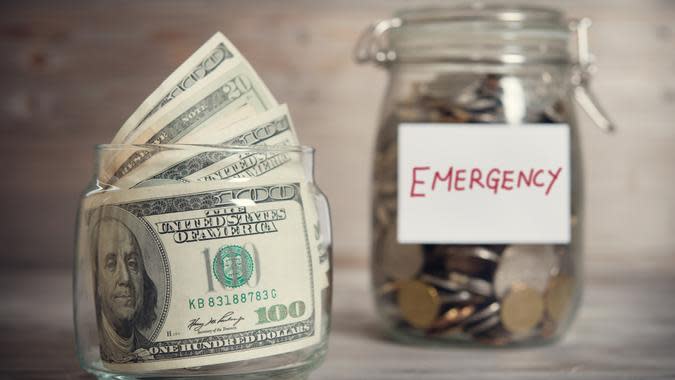17 Steps Millennials Can Take Now for a Brighter Financial Future

Thanks to the Great Recession, millennials -- now ages 26 to 41 -- have less financial stability than the generations before them. Generally speaking, millennials have low credit scores and high debts from student loans and credit cards. And more than half of American millennials have less than $10,000 saved for retirement, a GOBankingRates survey found. But the good news is time is on their side -- with several decades separating them from retirement age, there are many things millennials can do now to turn their financial lives around.
Follow Along: 31 Days of Living Richer
The Economy and Your Money: All You Need To Know
GOBankingRates put together some of the best tips on what every millennial should do for a better financial future if they're overwhelmed with debt or other money issues. See what you should do to set yourself up for financial success.

Improve Your Financial Literacy
If you really want to invest in yourself and your future, it's important to know what's truly best for your finances.
You can expand your financial knowledge by taking classes, hiring a financial coach or just reading more about the subject. Money will be important in your life for the rest of your life, so understanding this topic is a must do.
Learn: 12 Essential Money Tips for Every Phase of Your Financial Life

Create a Budget You Can Stick To
If you want to save money then you need to be sure you aren't spending more than you make. How can you do that? A budget.
By using a budget, you'll see where you might be overspending, making it that much easier to stop. Check your budget every month to make sure you're staying on track.
Find Out: 40 Money Habits That Can Leave You Broke

Work on Building Credit
Although many millennials likely already have a credit card, some might be hesitant to open one because they don't want the opportunity to incur credit card debt. However, it's important to start building credit as part of a long-term financial life plan.
"I always recommend people in their early twenties, at a minimum, open a credit card," said James M. Comblo, chief executive officer and president at FSC Wealth Advisors. "If you charge a tank of gas to that card each month and pay it off in full, your credit will begin to build rapidly."
Make More: 10 Easy Ways To Save $400 Every Month

Pay Down Debt
Because credit card debt tends to have a higher interest rate than other debts, you will want a solution for paying it down.
Millennials should consider taking out a personal loan as a debt repayment strategy since personal loans often have lower interest rates and could help to consolidate debt into one easy payment.
Habits: 16 Key Signs That You Will Always Be In Debt

And Don't Add More Debt
It's not uncommon to enter your 20s and 30s with credit card debt and student loan debt, but it's a mistake to keep adding to the debt by making credit card charges you can't pay off.
Credit card debt is high-interest debt, so once you have it under control or are getting it under control, don't set yourself up for failure by piling more on.

Have a Side Hustle
Danetha Doe, a money mentor and founder of Money & Mimosas, said that millennials should aim to earn extra income through a side hustle. Not only can it pad your savings, but it can also keep you financially secure through job loss or a salary reduction.
"I learned the importance of this shortly after graduating from university," she said. "I had a job in accounting at a $300 million company. Sounds secure, right? I thought so too, until the company went through a downturn -- resulting in my salary being cut by 20%. Thankfully I had a side hustle teaching Zumba that brought in the same amount of money that my salary had been cut."
To find your best side hustle, zero in on what you're really good at.
"My advice is to make a list of all of your skills," said Doe. "Then, choose ones that someone will hire you for and start promoting yourself. These skills could be anything from editing, writing, social media, playing an instrument, teaching a dance class -- the sky is the limit."

Be Mindful When You Do Spend
"Turn down plans that require spending too much money," said Katharine Perry, a certified financial planner with Fort Pitt Capital Group. "Once you've allotted for your savings and bills, you can work with the money that you have left over. This allows you to build your savings."
Perry also recommended prioritizing retirement savings over expensive travel plans, and giving friends and family home-cooked meals or DIY gifts instead of pricey store-bought presents.

Open a Savings Account -- and Contribute To It Regularly
If you don't already have a savings account, you should open one. And if you have one that's just been lying dormant, start contributing to it regularly.
"Saving just $25 a week can make a difference," said Perry. "Anything is better than nothing, and $25 a week is $1,200 a year. That's a good start, and it's really a way to help yourself. The sooner you start, the better your chances of developing the good habit of saving and succeeding."

Aim To Have 3 Months' Worth of Expenses Saved in an Emergency Fund
Many experts recommend that you have three to six months' worth of expenses in an emergency fund. Being prepared in this way will help you stay on track with your financial goals.

Start Investing Now
Investing is the top thing millennials should do if they want to be financially secure down the line, said Shaun Melby, CFP, a registered investment advisor and founder of Melby Wealth Management.
"Even if it's as little as $50 per month, just start," he said. "Depending on their age, [a millennial] could have 30 to 40 years of compounding interest to benefit their portfolios before they retire. Six thousand dollars invested every year for 40 years at an 8% annual average return would result in a portfolio balance of $1.86 million. Time is on our side -- by starting now, millennials can really have something to show for it when they retire."

Put Money Toward an 'Opportunity Fund'
Once you've built a healthy emergency fund and have automated investment contributions, consider putting any additional funds toward an "opportunity fund" that you can tap into when you find an unmissable investment opportunity.
"There will be many times throughout a 20-something's life where the stock market corrects, or they want to get involved in a local business or start-up, or purchase real estate. The goal is to have money available when those opportunities arise so we may take advantage of them," said Comblo. "Building an opportunity fund as a young professional or college graduate could quite possibly be the most impactful thing a person does financially."
Find Out: 37 Life Hacks That Will Save You Money

Contribute the Full Match Amount to Your 401(k)
If you're lucky enough to have a 401(k) at your job where your employer matches, contribute at least the amount to get the full amount of your employer's match. And then when you get bonuses or raises, contribute a little more to keep that account growing.
Contributing regularly to retirement accounts is an essential part of planning for the future.

Consider Opening a Roth IRA
If a millennial is in a lower income bracket now than they expect to be when they retire, they can benefit from contributing to a Roth IRA. You will want to consider consulting a tax advisor to make sure you're investing in the best way for your particular situation.
"While some people [who recently graduated] from college may land great jobs paying them a significant salary, most people do not. What I often tell my clients is to take advantage of the lower tax brackets now," said Comblo. "Create a Roth IRA and contribute the maximum allowed before [contributing to] any qualified plans, such as a 401(k), 403(b) or traditional IRA. This will take care of many retirement issues, mainly creating a tax-free stream of income that can be used to offset income taxes and maximize Social Security later on."

Automate Your Savings and Investment Contributions
To ensure you're meeting your savings and investing goals, make your contributions automatic. Whether some of your paycheck goes straight into your 401(k) or if you set a monthly transfer from your checking account to your savings account, you won't miss the money as much if you never really had it.
By automating, you don't have to remind yourself to do these things, which means you won't forget to save.

If You Can Buy Instead of Rent, Do It
Even if you don't need all the space, buy a home now if you can afford to do so.
Paying rent is pretty much like throwing money away. And if you don't need all the space that comes with a house purchase, you can make money on the big buy by letting friends room there and pay rent.

Purchase Disability and Life Insurance While You Can Still Benefit From Lower Rates
"Millennials should consider taking out reasonably priced and reasonably sized disability insurance policies if they work in high-income careers with a risk of losing that income after accruing hefty student loans," said Riley Adams, CPA and founder of personal finance blog Young and the Invested. "For example, young medical residents who have taken on six figures in student loans should consider protecting their income while disability insurance rates are low during their youth. While it might seem expensive now, the safety of knowing your income will be there if something tragic happens is worth the peace of mind and financial protection. The same is true of life insurance if you have a need for coverage (e.g., student loans, a mortgage, children, a family, etc.). Coverage only becomes more expensive as you age."

Get a Financial Accountability Buddy
Everything is more fun with a friend. So if you have some financial goals and so does a friend or family member, why not try to achieve them together? You can go over your goals and timeline, check-in with each other, encourage your successes and support each other when that financial mountain seems too high to climb.
More From GOBankingRates
GOBankingRates' Best Banks of 2022: Live Richer by Banking Better
Easy Things You Can Do To Start Preparing For Retirement Now
This article originally appeared on GOBankingRates.com: 17 Steps Millennials Can Take Now for a Brighter Financial Future
